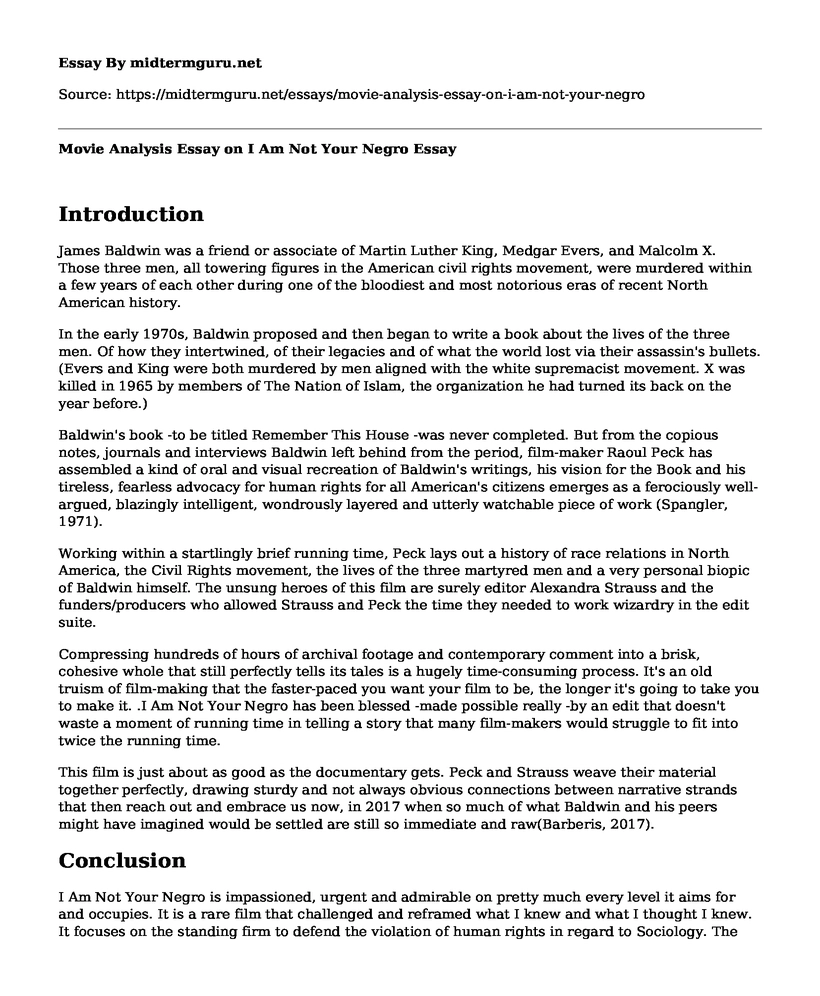Introduction
James Baldwin was a friend or associate of Martin Luther King, Medgar Evers, and Malcolm X. Those three men, all towering figures in the American civil rights movement, were murdered within a few years of each other during one of the bloodiest and most notorious eras of recent North American history.
In the early 1970s, Baldwin proposed and then began to write a book about the lives of the three men. Of how they intertwined, of their legacies and of what the world lost via their assassin's bullets. (Evers and King were both murdered by men aligned with the white supremacist movement. X was killed in 1965 by members of The Nation of Islam, the organization he had turned its back on the year before.)
Baldwin's book -to be titled Remember This House -was never completed. But from the copious notes, journals and interviews Baldwin left behind from the period, film-maker Raoul Peck has assembled a kind of oral and visual recreation of Baldwin's writings, his vision for the Book and his tireless, fearless advocacy for human rights for all American's citizens emerges as a ferociously well-argued, blazingly intelligent, wondrously layered and utterly watchable piece of work (Spangler, 1971).
Working within a startlingly brief running time, Peck lays out a history of race relations in North America, the Civil Rights movement, the lives of the three martyred men and a very personal biopic of Baldwin himself. The unsung heroes of this film are surely editor Alexandra Strauss and the funders/producers who allowed Strauss and Peck the time they needed to work wizardry in the edit suite.
Compressing hundreds of hours of archival footage and contemporary comment into a brisk, cohesive whole that still perfectly tells its tales is a hugely time-consuming process. It's an old truism of film-making that the faster-paced you want your film to be, the longer it's going to take you to make it. .I Am Not Your Negro has been blessed -made possible really -by an edit that doesn't waste a moment of running time in telling a story that many film-makers would struggle to fit into twice the running time.
This film is just about as good as the documentary gets. Peck and Strauss weave their material together perfectly, drawing sturdy and not always obvious connections between narrative strands that then reach out and embrace us now, in 2017 when so much of what Baldwin and his peers might have imagined would be settled are still so immediate and raw(Barberis, 2017).
Conclusion
I Am Not Your Negro is impassioned, urgent and admirable on pretty much every level it aims for and occupies. It is a rare film that challenged and reframed what I knew and what I thought I knew. It focuses on the standing firm to defend the violation of human rights in regard to Sociology. The documentary has some significant importance in social co-operation and mobilization of people to fight for their rights.
Work Cited
Peck, R., Baldwin, J., Grellety, R., Aigui, A., Jackson, S. L., Deluxe, S., & Barberis, M. H. (2017). I am not your Negro. Altitude.
Spangler, E. (1971). The Negro in America. Lerner Publications Company.
Cite this page
Movie Analysis Essay on I Am Not Your Negro. (2022, Dec 27). Retrieved from https://midtermguru.com/essays/movie-analysis-essay-on-i-am-not-your-negro
If you are the original author of this essay and no longer wish to have it published on the midtermguru.com website, please click below to request its removal:
- Essay on Terrorism as an Overall Threat
- Comparative Essay on Artistic Styles
- Essay Sample on Role of a Director in Film
- Film Analysis Essay on Carrie
- TV's Effects on Mind: Reduced Brain Activity, Addiction, and More - Research Paper
- Betty Foy Sanders' Art Center at Georgia Southern University - Essay Sample
- Paper Example on Colourism and Tri-Racial System







